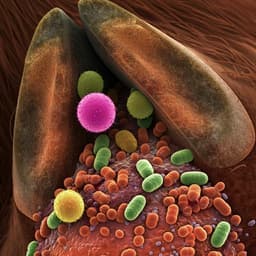
Biology
Regulatory fine-tuning of *mcr-1* increases bacterial fitness and stabilises antibiotic resistance in agricultural settings
L. Ogunlana, D. Kaur, et al.
Discover how regulatory evolution fine-tunes *mcr-1* expression in *E. coli*, allowing for high resistance against colistin with low fitness costs. This study by Lois Ogunlana, Divjot Kaur, Liam P. Shaw, Pramod Jangir, Timothy Walsh, Stephan Uphoff, and R. C. MacLean explores the stability of antibiotic resistance in pig farms after colistin was banned.
~3 min • Beginner • English
Related Publications
Explore these studies to deepen your understanding of the subject.







